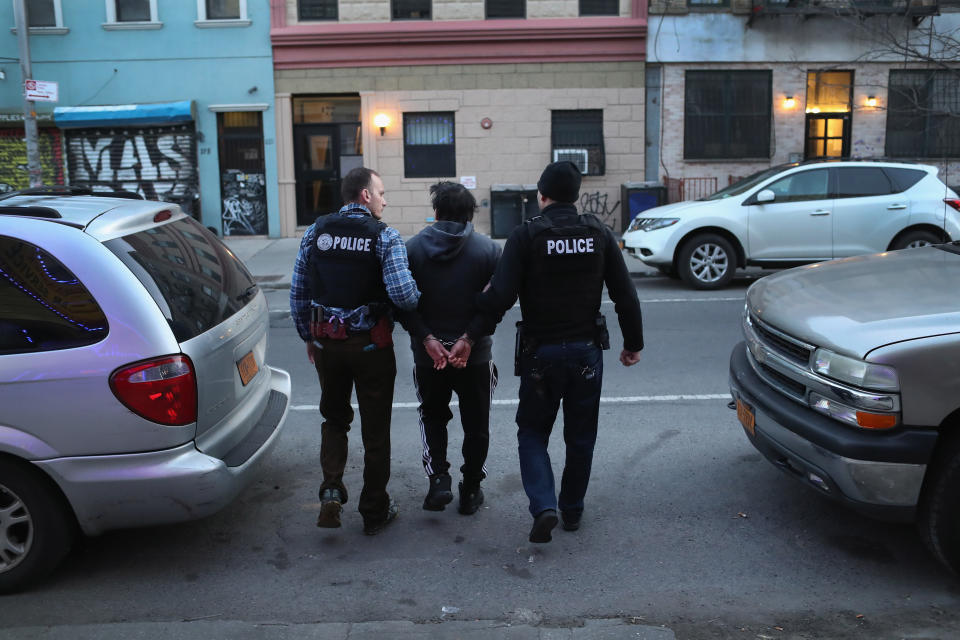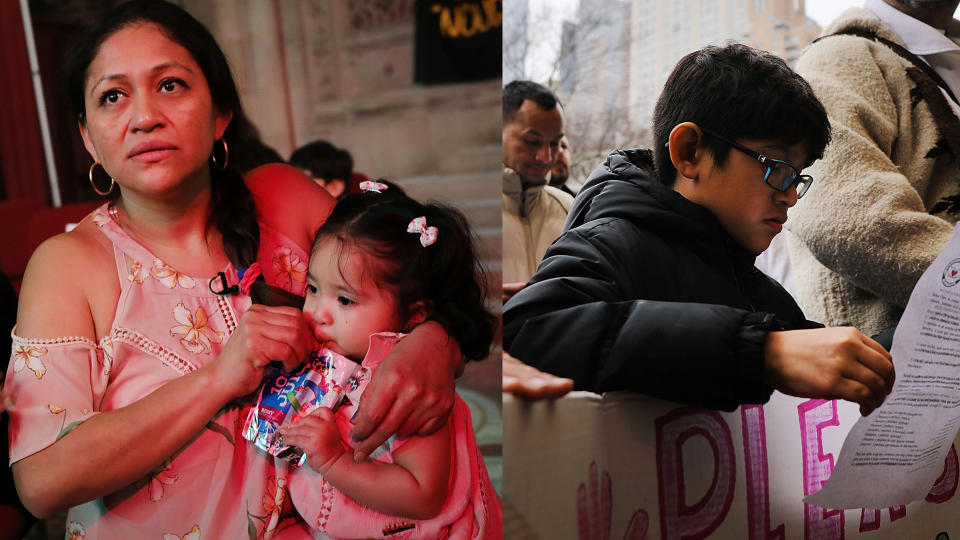Unfiltered: ‘We are human beings’
In the middle of an empty Manhattan church on a Wednesday afternoon sits Rev. Juan Carlos Ruíz, adjusting his priest collar. Outside, people cross the street to and from Central Park. Although it is April, they are still dressed in winter coats.
Upstairs in a room inside the church, Aura Hernández plays with her toddler daughter. Every so often, you can hear coos and happy yells echoing off the church’s old walls.
“We have a whole apparatus that criminalizes people,” the reverend says. “That sees people not as people, but as a threat.”
“So we have many, many people who are living in the shadows.”
Aura Hernández is one of those people. An undocumented immigrant mother of two, she fled violence and an abusive relationship in her native Guatemala for a better life in the United States. She was issued a final deportation order for March 1, and, fearful of being separated from her U.S.-born children, she sought help at a free legal clinic hosted by Rev. Ruíz’s organization, the New Sanctuary Coalition. A few weeks later, she moved to a church with her youngest child — and hasn’t stepped outside since.
In this week’s episode of Yahoo News’ “Unfiltered,” Rev. Ruíz shows us the daily struggles facing undocumented immigrants in America, including a mother who has taken to living in a church for fear of being deported.
The New Sanctuary Coalition, a network founded by Ruíz and other religious leaders, is striving to revitalize the sanctuary campaign of the 1980s: The original movement had enlisted churches to transport, house and hide refugees fleeing to the U.S. from the civil wars in El Salvador and Guatemala.
“We work with families and communities who are facing deportation,” Rev. Ruíz explains. New Sanctuary provides legal resources and support to immigrants in their fight for legal status, offering free weekly legal clinics where they can review their paperwork, attend group meetings outlining the legalization process, and even a program in which immigrants are paired with volunteers who accompany them to their mandatory check-ins with Immigration and Customs Enforcement, or ICE.
They also work to provide sanctuary spaces to undocumented immigrants who are in immediate danger of being deported.
“The government talks about sensitive spaces. Places where la migra, ICE, cannot violate. And those sensitive spaces are schools, clinics, hospitals … and churches.”
Taking shelter at those locations, however, does not mean the individual is immune to deportation.
“Here in New York we have seen ICE violating some of the schools. We have seen them violating some of the hospitals,” says Rev. Ruíz. “More and more, we are being accustomed to seeing weaponized people going into our homes, into our communities and snatching and kidnapping people away. Without any defense.”

“These are not people that came here yesterday: They’ve been with us for the last four decades. Forty years. And they are still checking in. … It is like the parole system. You have to be under supervision.”
There are approximately 2.3 million immigrants checking in with immigration agencies nationwide, including DACA recipients and those with temporary protected status. “We talk about these 2.3 million people being the low-hanging fruit, which the administration is going after.”
“They have their names. They have their family, friends. They know where they work. They know where they go to school.”
Rev. Ruíz says that this constant fear of deportation causes many people to say, “I cannot go through this humiliation. I cannot put my family in such uncertainty … that my kids drop out of school because they don’t want to leave my side.” The end result is that they sometimes make the difficult decision to “self-deport” to their home country.
Back in the church, Aura’s daughter laughs and crawls her way to the altar. Absent is Aura’s 10-year old son, Daniel, who lives in Westchester with his father. He visits Aura on the weekends and plans to move in with her in the summer, after the school year ends.
“The baby, she has no idea what’s going on,” says Aura, with Rev. Ruíz by her side. “She can tell we are not in our home, that we aren’t with our family, that we see them very little. She feels that a lot, but it’s my 10-year-old son who understands more: He’s the one who’s being affected the most psychologically.”

Clutching a notebook close to her chest, Aura talks about what it’s like to live in the church. “It’s a change, because it’s not your home. But you adapt to it by knowing you’re fighting for something, and that is the well-being of your family.”
With the recent changes made by the current presidential administration to restrict immigration, specifically those of illegal migrants, Rev. Ruíz fears that the situation will only worsen. “I need to remind myself, and I need to remind people that our humanity is in danger. And we need to, somehow, find ways of resisting together, celebrating our diversity, and really organize ourselves, so that the change that we need may be a reality so that everybody can enjoy and live in dignity and in peace.”


